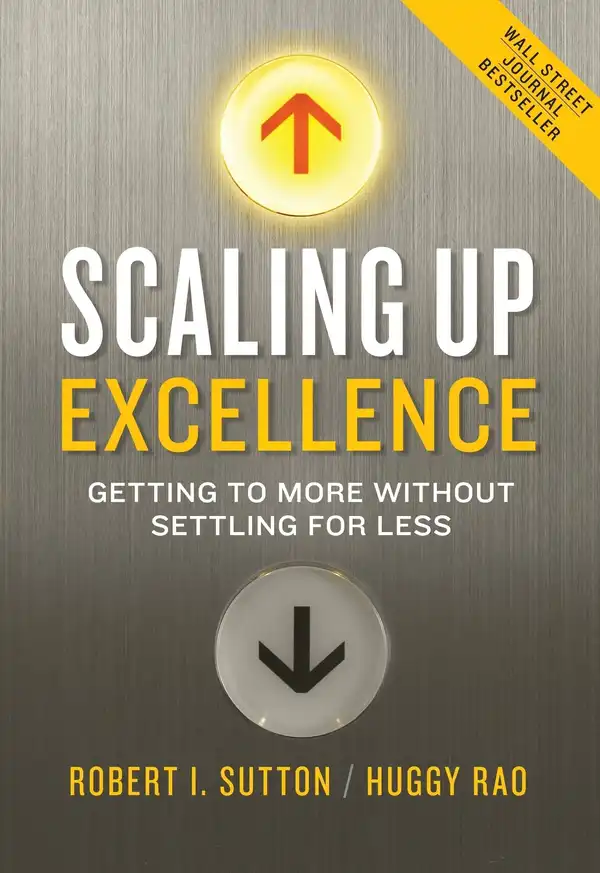Highlights
- effective scaling isn’t simply a matter of running up the numbers by replicating the same old magic again and again.
- It means constantly seeking and implementing better ways of thinking and acting across old and new corners of the system.
- Organizations that scale well are filled with people who talk and act as if they are in the middle of a manageable mess.
- Scaling requires grinding it out, and pressing each person, team, group, division, or organization to make one small change after another in what they believe, feel, or do.
- Tags: management scaling
- When big organizations scale well, they focus on “moving a thousand people forward a foot at a time, rather than moving one person forward by a thousand feet.”
- Tags: scaling management
- Spread a mindset, not just a footprint.
- Tags: management scaling
- Link short-term realities to long-term dreams.
- Tags: organization-design scaling leadership
- Accelerate accountability. Build in the feeling that “I own the place and the place owns me.”
- Fear the clusterfug. The terrible trio of illusion, impatience, and incompetence are ever-present risks. Healthy doses of worry and self-doubt are antidotes to these three hallmarks of scaling clusterfugs.
- Tags: leadership scaling
- Scaling requires both addition and subtraction. The problem of more is also a problem of less.
- Slow down to scale faster—and better—down the road. Learn when and how to shift ears from automatic, mindless, and fast modes of thinking (“System 1”) to slow, taxing, logical, deliberative, and conscious modes (“System 2”); sometimes the best advice is, “Don’t just do something, stand there.”
- Tags: management scaling
- When someone at the Directors’ College asked Campbell about the most crucial skill for a senior executive, he said it was the rare ability (which Jobs had in spades) to make sure that the short-term stuff gets done and done well, while simultaneously never losing sight of the big picture.
- Tags: management
- Research by New York University’s Yaacov Trope and his colleagues shows that thinking about distant events is good because we focus on long-term goals—and it is bad because we manufacture unrealistic fantasies.
- But thinking only about looming deadlines and short-term goals is a mixed bag as well. We focus on what is feasible, on the steps to take right now, but we forget or downplay long-term goals. So we direct our efforts toward achievable milestones even when they undermine our ability to reach our ultimate destination.
- Scaling requires the wherewithal to hound yourself and others with questions about what it takes to link the never-ending now—the perpetual present tense that every person is trapped in—to the sweet dreams you hope to realize later.
- Accountability means that an organization is packed with people who embody and protect excellence (even when they are tired, overburdened, and distracted), who work vigorously to spread it to others, and who spot, help, critique, and (when necessary) push aside colleagues who fail to live and spread it.
- Tags: management leadership
- As organizations grow larger and older, as the footprint of a program expands, and as the consequences of past actions accumulate, once useful but now unnecessary roles, rules, rituals, red tape, products, and services build up like barnacles on a ship; to make way for excellence to spread, these sources of unnecessary friction must be removed.
- Tags: management organization-design
- The broader lesson is that mastering “the black art of scaling a human organization” requires learning when and how to shift gears from fast to slow ways of thinking.
- Tags: management scaling organization-design
- Scaling is akin to running a long race where you don’t know the right path, often what seems like the right path turns out to be the wrong one, and you don’t know how long the race will last, where or how it will end, or where the finish line is located.
- Tags: organization-design
- managing the tension between replicating tried-and-true practices and modifying them (or inventing new ones) to fit local conditions weighs on decision makers, shapes key events, and leads to success or failure.
- The best leaders and teams often strike the right balance between replication and customization, between Catholicism and Buddhism, by acting much as if they are working with Lego “bricks.”
- Tags: management organization-design leadership
- A mindset should be treated like a compass or the global positioning system in your car or on your phone. It is something that points you in the right direction most of the time. But you can’t follow it blindly; otherwise, every now and then, you will plow into obstacles that you should have steered around or miss your destination.
- Tags: personal-growth
